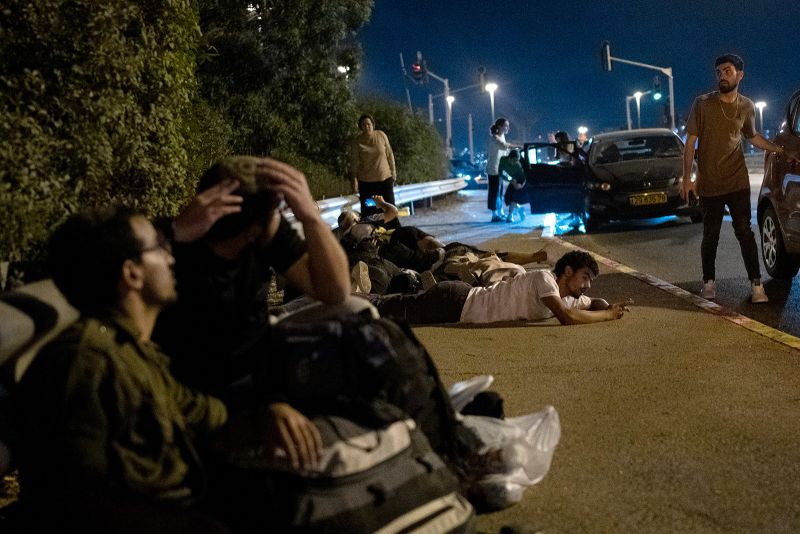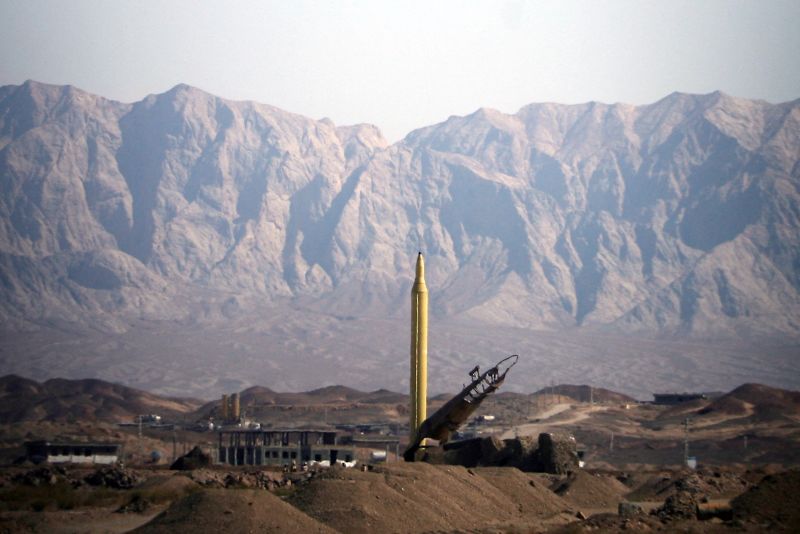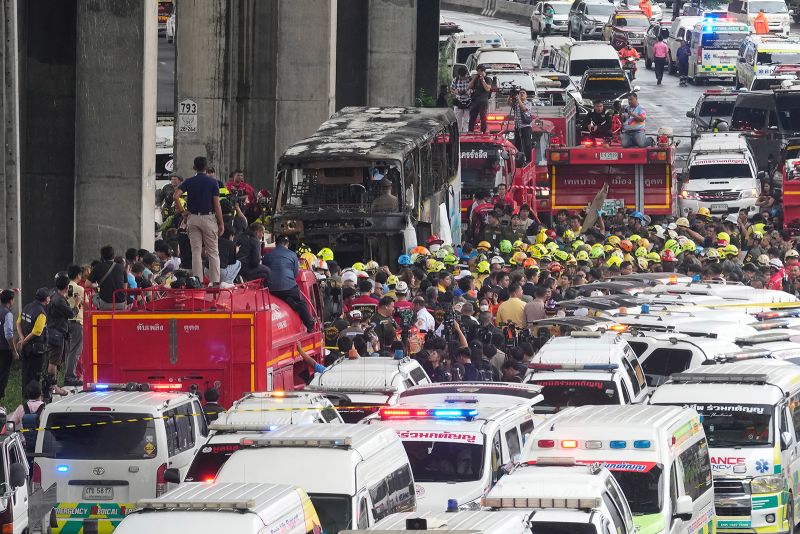How might Israel respond to Iran’s missile barrage? Here’s what we know

The Middle East is edging ever closer toward a full-blown regional war as Israel vowed to respond to Iran’s huge barrage of ballistic missiles fired at the country on Tuesday night, capping a day of dramatic military escalation in the region.
“Iran made a big mistake tonight – and it will pay for it,” Israeli Prime Minister Benjamin Netanyahu said hours after the unprecedented attack.
Iran launched a salvo of about 200 ballistic missiles at Israeli military targets, its largest ever such attack, sending sirens blaring across Israel and activating the country’s sophisticated defensive systems.
Iran’s leadership said the attack was intended as a warning to Israel not to enter a direct war with its longtime enemy, and any Israeli response to the barrage would be met with “stronger and more painful” blows.
The escalation came about 24 hours after Israel launched a ground war in Lebanon to go after Hezbollah, a powerful militant group that is backed by Iran, and days after Israel killed its leader Hassan Nasrallah in a strike on Beirut.
Here’s what we know.
Regional war widens
Tuesday’s attack has further changed the dynamics of the conflict, transitioning from a war involving Iran’s proxies toward a direct confrontation between two regional military powerhouses.
It’s the second time Iran has launched an aerial attack on Israel this year, but Tuesday’s barrage was of a different magnitude.
In April, Iran launched an unprecedented large-scale drone and missile attack at Israel – the first such direct assault on the country from its soil – in retaliation for a suspected Israeli strike on an Iranian diplomatic complex in Syria.
Iran gave 72 hours notice ahead of that attack, which was widely seen as designed to minimize casualties while maximizing spectacle with almost all of the 300 projectiles knocked out of the sky by Israel’s defense systems.
Israel responded a week later with a limited strike on Iran.
This time, Israel learned about the imminent threat just hours before Tehran launched the strikes, with targets including the headquarters of Israeli intelligence agency Mossad, in Tel Aviv, Israel’s second largest city, Nevatim Air Base and Tel Nof Air Base.
Pentagon spokesperson Maj. Gen. Pat Ryder said Iran’s Tuesday barrage was twice as large as the April attack. It also included many more ballistic missiles, which are harder to shoot down, posing a real threat to Israeli citizens – many of whom evacuated to shelters during the attack.
While the Israeli military said most of the missiles were intercepted, some landed on Israeli soil and appeared to cause damage. Shock waves caused by the attack also damaged homes in central Israel, authorities in the country said.
Has diplomacy in the Middle East failed?
Diplomacy has so far failed to broker a deal between Israel and Hezbollah, and the ceasefire and hostage negotiations between Hamas and Israel have floundered.
“I think Nasrallah was the final straw” for Iran, said Jonathan Panikoff, a former senior intelligence analyst specializing in the region.
With no off-ramp, and Israel appearing unwilling to compromise with its regional enemies, Tuesday’s attack is perhaps the clearest sign a much-feared regional war may be about to ignite.
Meanwhile, both Israel and the US downplayed the effectiveness of the strike. Israel said the attack “failed.”
How we got here
In almost a year of war, increasing escalations have repeatedly brought the region to the edge of an all-out conflict.
In recent days, Israel’s ground incursion into southern Lebanon opened up a whole new front and it has ramped up attacks against other Iran-backed militants, including launching strikes targeting the Houthis in Yemen.
Israel has eliminated Hezbollah’s leadership with a series of attacks and massive airstrikes across Lebanon that have targeted the group’s infrastructure and capabilities, but which have also killed more than 1,000 people, displaced about 1 million, and destroyed homes and neighborhoods.
In Gaza, Israel’s war against Hamas grinds on almost a year after the Palestinian militant group’s attack on Israel. The ensuing war has killed more than 41,000 people, creating a catastrophic humanitarian crisis and left much of the enclave in ruins.
Hamas, Hezbollah and the Houthis are all part of an Iranian-led alliance spanning Yemen, Syria, Gaza and Iraq that has attacked Israel and its allies since the war began. They say they won’t stop striking Israel and its allies until a ceasefire is reached in Gaza.
What might both sides do next?
Iran has attempted to characterize its attack as a calibrated response to repeated escalations from Israel.
Iran’s Islamic Revolutionary Guard Corps said Tuesday’s missile strikes focused on Israeli security and military targets and was in response to Israel’s killing of Nasrallah and other commanders, including Hamas political leader Ismail Haniyeh in the Iranian capital Tehran in July.
Following the assassination of Hamas’ most public figure after attending the inauguration of Iran’s new president, the world held its breath as it waited to see how Tehran would respond.
For months, that response never came and tensions appeared to de-escalate given the grave consequences of an all-out war in the Middle East.
But Israel’s assassinations and the widening war in Lebanon has rapidly changed that equation.
On Saturday, Netanyahu gave a fiery speech directed at Iran, saying Israel was “changing the balance of power in the region” and that “there is no place in Iran or the Middle East that the long arm of Israel will not reach.”
Nasrallah’s death was necessary, he said, to returning thousands of residents to their homes along the Lebanon border displaced by Hezbollah rocket attacks, and to prevent the group from launching a large-scale attack on Israel.
US officials have long assessed that both Iran and senior Hezbollah leadership has wanted to avoid all-out war with Israel, even as both have exchanged fire.
One big fear for US and Arab diplomats is the possibility of Israel striking inside Iran, potentially against its nuclear facilities. Former Israeli Prime Minister Naftali Bennett urged Israel to retaliate by destroying its nuclear program.
But Iran has made clear that any response from Israel would result in further escalation. Iran’s President Masoud Pezeshkian said Tuesday’s operation was “only a portion of our power.”
And Hezbollah itself also remains a dangerous adversary for Israel with an arsenal of military assets it could bring to bear.
US involvement
The US, Israel’s closest ally and biggest weapons supplier, says it will coordinate with Israel on its response to the attack, with State Department spokesperson Matthew Miller pledging there would be consequences.
US Navy destroyers fired interceptors against the Iranian missiles and in recent weeks, the US has moved more of its troops and warships to the region.
Since Israel’s war in Gaza began, US troops have also been the target of escalating attacks by Iran-backed proxy groups. In January, three US Army soldiers were killed and more than 30 service members injured in a drone attack on a small US outpost in Jordan.
During that time, the US has repeatedly stood firm with Israel. Defense Secretary Lloyd Austin said the US will “never hesitate” to protect US forces and interest in the Middle East, and that the US remains ready and “postured” to defend its own forces and Israel.







